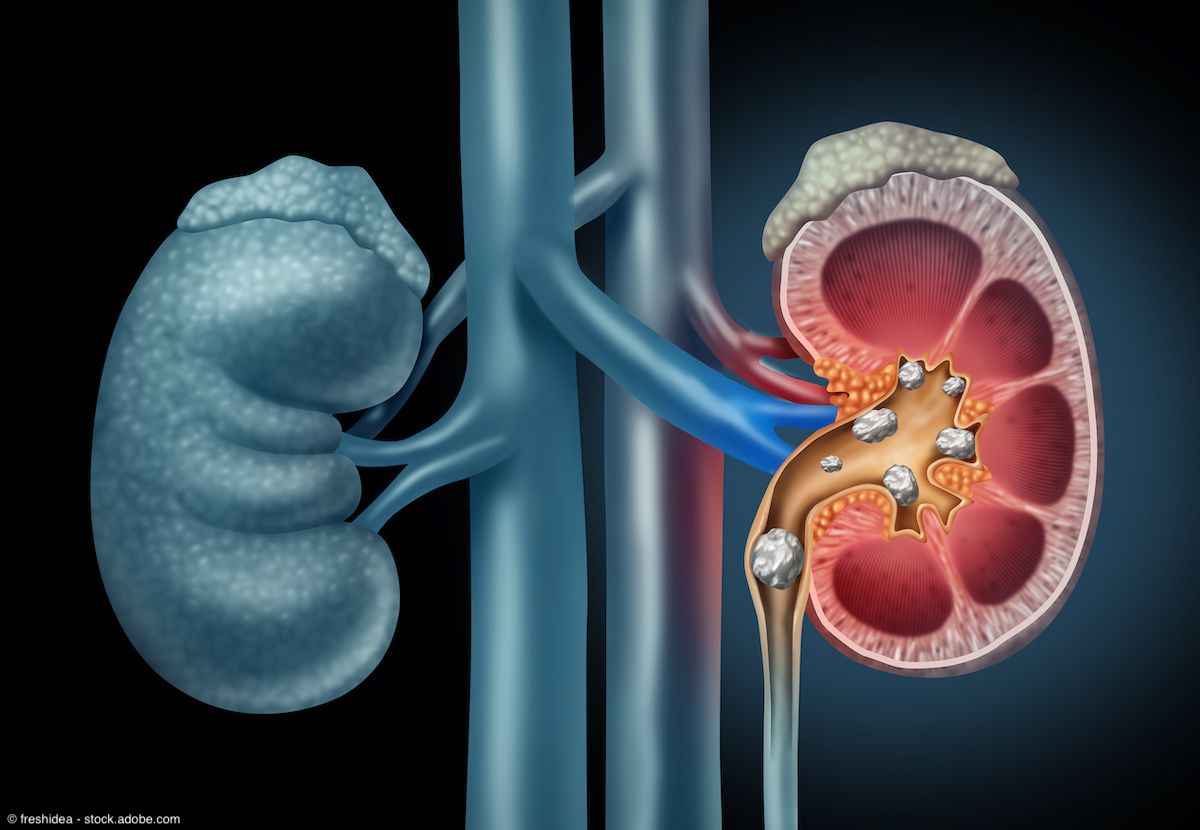News
Article
Top 10 kidney stone stories in 2023
Author(s):
As the year comes to a close, we revisit some of this year’s top content on kidney stones.
There’s been an abundance of news surrounding stone disease over the last year. In honor of these breakthroughs, Urology Times® is highlighting our top content on kidney stones from 2023.

Mini-PCNL has higher stone-free rate than ureteroscopy and similar cost burden
Data published in the Journal of Urology showed that patients with intermediate-sized kidney stones who underwent mini-percutaneous nephrolithotomy (mPCNL) were more likely to achieve stone-free outcomes compared with those who underwent ureteroscopy (URS). Further, higher costs among patients in the mPCNL group vs the URS group were found to offset each other due to the nonsignificant operating margin. Read more on the study here.
PCNL equipment whiteboard shown to improve surgical team communication
The implementation of a real-time editable whiteboard to communicate required PCNL equipment needed for cases led to improved perception of team communication, case item accuracy, and relative average cost savings for the procedure.
In correspondence with Urology Times, lead author Jenny N. Guo, MD, commented, “We found that after implementation of the whiteboard, general cost savings of $436.81 USD per PCNL case and $488.22 USD per renal moiety were achieved.” Read more on the findings here.
Dr. Allam on stent usage after upper ureteral and kidney stone treatment
In an interview with Urology Times, Christopher Allam, MD, discussed the key take-home messages from the Journal of Endourology study, “The Role of Routine Ureteral Stenting Following Uncomplicated Ureteroscopic Treatment for Upper Ureteral and Renal Stones: A Randomized Control Trial.” Allam is the program director of the SAUSHEC Urology Residency, urology consultant to the Air Force Surgeon General, Director of Air Force Endourology, Laparoscopic, and Robotic Surgery, and an assistant professor of surgery at Uniformed Services University of the Health Sciences in Bethesda, Maryland. Watch the discussion here.
MUSC Kidney Stone Center ensures patients with kidney stones get treatment within 24 hours
MUSC Health launched a designated Kidney Stone Center with a hotline that offers treatment for patients within 24 hours. The center is led by urologist Stephen Savage, MD. Read more on the initiative here.
Novel approach shows efficacy in fragmenting kidney stones
A proof-of-concept study by Cleveland Clinic investigators showed that fragmenting kidney stones using photonic nanoparticles is effective for several common types of stones.
“One of the unique properties of certain nanoparticles is their ability to produce both mechanical and thermal energy which we thought could be strong enough to break stones. This made them a good candidate for investigation as a kidney stone treatment,” said Smita De, MD, PhD. Read more on the technique here.
Break Wave Lithotripsy appears safe and efficacious in urolithiasis
Data presented at the 2023 American Urological Association Annual meeting in Chicago, Illinois showed safety and efficacy of Break Wave Lithotripsy in the treatment of patients with urolithiasis. In a first-in-human, prospective clinical trial (NCT03811171) that enrolled patients with ureteral or renal stones, stone fragmentation was observed among 88% of patients. Read more here.
Evidence lacking for over-the-counter products for recurrent stones
In an interview with Urology Times, Brett Johnson, MD, discusses key takeaways from his American Urological Association 2023 Annual Meeting State-of-the-Art Lecture: “Over-the-counter remedies for recurrent stone formers: Where is the evidence?” Johnson is an assistant professor of urology at the University of Texas Southwestern Medical Center in Dallas, Texas. Read the full discussion here.
Greater consumption of added sugars is linked with kidney stone prevalence
Data published in Frontiers in Nutrition showed an association between adults who consumed a diet high in added sugars and kidney stones. Participants who were in the highest (4th) quartile of the study population based on added sugar intake had a 39% increased risk of developing kidney stones over the study period (2007-2018) compared with those in the lowest quartile (OR = 1.39; 95% CI, 1.17 to 1.65; P < .001). Read more here.
Fluid intake reminder system helps patients with kidney stones increase urine volume
The use of mini sipIT, a reminder system that includes a connected water bottle and a mobile app, was shown to be feasible in providing fluid intake feedback to increase 24-hour urine volume among patients with kidney stones. In total, 73% of patients showed an increase in 24-hour urine volume from baseline to the end of the 1-month trial period. Read more here.
FDA approves nedosiran for primary hyperoxaluria type 1
In October 2023, the FDA approved nedosiran (Rivfloza) injection for the treatment of children 9 years and older and adult patients with primary hyperoxaluria type 1 (PH1) who have relatively preserved kidney function. Nedosiran is a once-monthly subcutaneous RNA interference therapy designed to lower urinary oxalate levels in patients with PH1, which is a rare, inherited condition that leads to recurrent kidney stones and/or nephrocalcinosis and may lead to chronic kidney damage. Read more on the approval here.
You can view all of our content on kidney stones here.
Newsletter
Stay current with the latest urology news and practice-changing insights — sign up now for the essential updates every urologist needs.









